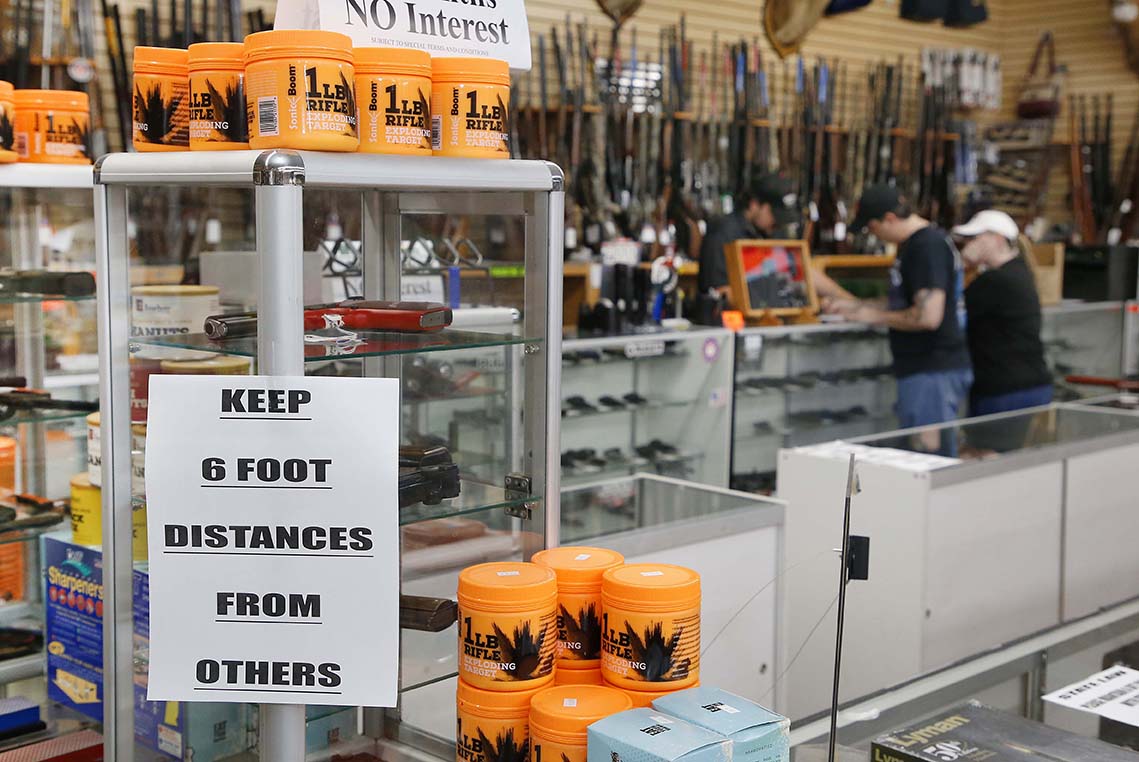Across the nation as confirmed COVID-19 cases continue to rise, people are stocking up on more than groceries and toilet paper. Americans are buying firearms and ammunition during a global pandemic — and doing so in record numbers. But the spike in sales might be temporary.
A gun dealer in Anniston, Ala., said his store was no different.
“We are seeing a surge both in guns and ammunition,” said Richard Patty, owner of Shotgun Sports Supply Company. On March 30, the Monday before Gov. Kay Ivey’s mandatory stay-at-home order went into effect, Patty saw more than 100 customers. The following Monday, only five people came to his store.
The FBI reported 3.7 million background checks in March, the highest ever recorded number since the agency first began its tracking system. A reported 92,652 of those checks were conducted in Alabama. By comparison, there were 51,923 checks in March 2019. April numbers will be reported in May, which will show whether the trend continues.
When the global pandemic first hit the U.S., there were reports of long waiting lines at gun shops. And in Alabama, some stores said they’d be stocking up on weapons and protective gear to avoid empty shelves.
“We’re seeing folks come in who’ve never bought with us before,” Patty said. “I think everybody is just sort of scared of what could happen, you know.”
In the past, gun and ammunition sales have been bolstered by events like mass shootings that spark conversation around gun laws. This appears to be the first time anxiety over a public health crisis has contributed to a widespread rise in sales.
“Guns and ammunition are like any commodity. Supply and demand can be based on emotion and speculation,” said retired Chief Deputy Jon Garlick of Anniston, a licensed counselor and former Calhoun County mental health officer, in an email.
He categorizes gun owners as professional (law enforcement, security), sportspeople (hunters, competitive shooters), collectors, concerned citizens (own for protection), preppers (those preparing for a society-changing crisis) and criminals/crusaders.
[Related: Rural Residents Who Struggle With Mental Illness Are Isolated, Stigmatized, Not Near Help]
[Related: Q&A: How We’ve Criminalized Mental Illness]
[Related: Therapists Urge Seeking Help Immediately After Suicidal Thoughts]
That final category includes people who may be excluded from legal ownership based on criminal record or mental health status, Garlick said. These are people who are “paranoid … who may or may not have delusions or agendas,” he said. “They are ‘triggered’ (no pun intended, but recognized) by this event and are looking to stock up and get ready. These folks are less likely to be purchasing from traditional gun stores for obvious reasons.”
He added, “The non-gun-owning society, as a rule, likes to group all gun enthusiasts into the last category.” But most gun owners “are typically worried about these types of mass events in which, “just like toilet paper, stores may run out of guns and ammo.”
As the public makes sense of staying healthy and employed, they’re also worrying about an uncertain future. A firearm may offer a sense of protection, but experts urge people to take safety seriously.
Bringing a firearm home increases the likelihood of the gun harming a resident under that roof during a crisis of domestic violence or a mental health episode.
If someone brings a gun home, firearm experts said it’s important to practice safe storage — unloaded and locked away — to prevent any unauthorized users, especially children, from accessing a loaded weapon.
Most safety classes taught by law enforcement or private businesses are currently suspended in response to COVID19.
The Civilian Marksmanship Program, a national firearm training and safety organization with a store in Anniston, is closed until May 4. A statement on their website reads: CMP will monitor conditions and will report changes to that plan as required. We encourage all CMP match sponsors to cancel their matches until some degree of normalcy returns.
Patty said his store, considered an essential business, will remain open.
“We’ve got signs up everywhere to remind people” to stay six feet apart, he said.
This story was produced in conjunction with The Anniston Star. It is part of the Juvenile Justice Information Exchange’s project on targeting gun violence. Support is provided by The Kendeda Fund. The JJIE is solely responsible for the content and maintains editorial independence.

Pingback: Ammo Website - 9mm Ammo